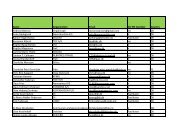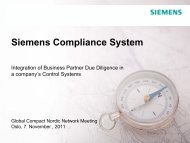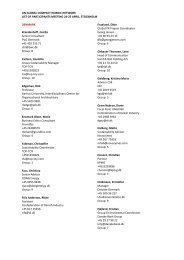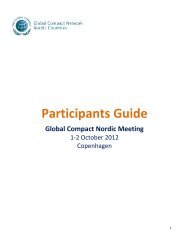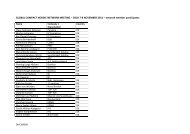Business Against Corruption - A Framework for Action - International ...
Business Against Corruption - A Framework for Action - International ...
Business Against Corruption - A Framework for Action - International ...
- No tags were found...
Create successful ePaper yourself
Turn your PDF publications into a flip-book with our unique Google optimized e-Paper software.
3Introduction: The pressure continues to buildThere are many reasons why the eliminationof corruption has become a priority withinthe business community. Confidence andtrust in business among investors, customers,employees and the public have been erodedby recent waves of business ethics scandalsaround the globe. Several high-profile casesof bribery are currently being investigated orprosecuted. Companies are learning the hardway that they can be held responsible <strong>for</strong> notpaying enough attention to the actions oftheir employees, associated companies, businesspartners and agents.The rapid development of rules of corporategovernance around the world is alsoprompting companies to focus on anti-corruptionmeasures as part of their mechanisms toexpress corporate responsibility and to protecttheir reputations and the interests of theirstakeholders. Their anti-corruption systemsare increasingly being extended to a rangeof ethics and integrity issues, and a growingnumber of investment managers are lookingto these systems as evidence that the companiesundertake good business practice and arewell-managed.The decades-long underestimation of thesocial and economic costs of corruption isbeing replaced by an understanding across allsectors of its devastating impact on our society.Virtually all countries have now criminalizedbribery within their domestic arenas,and, recognizing that corruption is not justa local or a national problem but to a largeextent a regional and international problem,various international organizations have developedinstruments to fight corruption at theglobal level. In most countries where corruptionis rife, there are also local organizationsand pressure groups working to combat it.The international fight against corruptionstarted to gain momentum through the 1997Organisation <strong>for</strong> Economic Co-operation andDevelopment (OECD) Convention on CombatingBribery of Foreign Public Officials in <strong>International</strong><strong>Business</strong> Transactions, and throughthe adoption of the first globally agreed-uponinstrument, the United Nations Conventionagainst <strong>Corruption</strong> (UNCAC) in 2003 and itssubsequent entry into <strong>for</strong>ce in December 2005.The introduction of the UN Global Compact’s10th Principle against <strong>Corruption</strong> in 2004 was afurther significant step in bringing anti-corruptioninto the corporate responsibility agenda.National ef<strong>for</strong>ts to bolster transparencyand anti-corruption en<strong>for</strong>cement have followedsuit, with international effect. As of2010, all mining, oil and gas firms listed onthe New York Stock Exchange are legallyobligated to disclose payments made togovernments <strong>for</strong> access to natural resources.The Hong Kong Stock Exchange has alreadyintroduced similar rules <strong>for</strong> newly listed companies,and, as of March 2011, the EuropeanCommission is expected to pass a similarlaw. Laws and ministries requiring increasedtransparency as a corruption-fighting devicehave recently arisen around the world,from Bangladesh and Bolivia to Jordan andSenegal. Laws criminalizing corruption havebeen strengthened in places such as China,India, Russia and Uganda, while Brazil’sFicha Limpa law bars anyone convicted ofserious crimes, including corruption charges,from running <strong>for</strong> political office. The UnitedStates has increased the en<strong>for</strong>cement of itsanti-corruption laws and the correspondingpenalties, and in eastern Africa the KenyanAnti-<strong>Corruption</strong> Commission is continuing tomake progress 1 .Activity in this area goes beyond organizationscomprising government ministers: Agrowing number of international organizationsare not only recognizing the role ofbusiness in proactively fighting corruptionas crucial <strong>for</strong> success, but are also expectingbusinesses to do something about it. TheGroup of 20 (G20) has recognized business asa stakeholder in anti-corruption ef<strong>for</strong>ts andconsiders its engagement essential. The UNGlobal Compact, the <strong>International</strong> Chamberof Commerce, Transparency <strong>International</strong>,and the World Economic Forum—Partnering<strong>Against</strong> <strong>Corruption</strong> Initiative (PACI) led asix-month campaign concluding with a statementsigned by leading CEOs from around theworld, which led to the adoption of a resolutionby the Conference of States Parties explicitlyreferring to the role of the private sectorin monitoring and reviewing the UNCAC.The world’s multilateral developmentbanks (MDBs)—including the World Bank,1See, e.g., The Fight <strong>Against</strong> <strong>Corruption</strong>: Naming and Shaming. (2010, October 28). The Economist.




